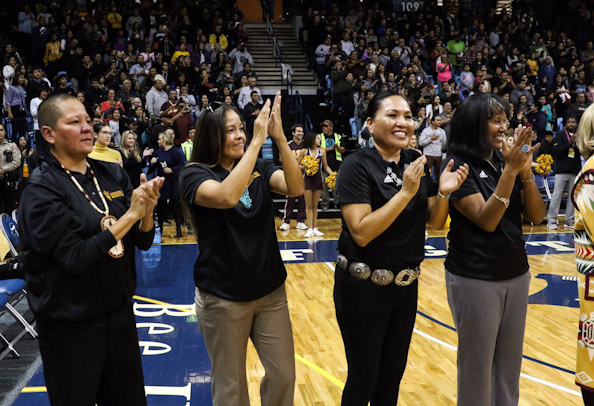FORT DEFIANCE, Ariz. (AP) — Basketball opened a window for Ryneldi Becenti, transporting her from the Navajo Nation to Arizona State University, around the world and back again.
Home on the Rez, she’s teaching the game she loves to Native American kids, giving back by dishing out wisdom and inspiration with each bounce of a ball.
On Sunday, those kids and the rest of the Navajo Nation glimpsed through a window into the world of major college basketball.
No. 4 Baylor against No. 23 Arizona State was more than a matchup between Top 25 teams. It was a happening in the heart of the Nation, an opportunity for a basketball-loving people to watch two of the nation’s top women’s programs play in their own backyard.
“Never in my wildest dreams did I think this would ever happen,” Becenti before Baylor beat Arizona State 65-59. “I get chills and choked up just thinking about it. This is a huge deal for the Navajo Nation and the communities here.”
Through the years, Sun Devils coach Charli Turner Thorne has embraced the Native American people of northern Arizona and eastern New Mexico. Arizona State celebrates Native American culture at a game every season and Turner Thorne has signed multiple players from the reservation to play in Tempe.
Wanting to do something different this year, Turner Thorne worked with ASU’s Office of American Indian Initiatives and the Navajo Nation to play the Showdown at the Rez at the 6,500-seat BeeHoldzil Fighting Scouts Events Center in Fort Defiance.
Arizona State honored Native Americans at the game, along with veterans on Veteran’s Day weekend, including Navajo code talkers. ESPN also had a crew at the Rez to broadcast the game to a national audience.
“We always have a game honoring Native Americans and this year we wanted to bring the game to them,” Turner Thorne said. “It’s so much more than just a game.”
Turner Thorne brought up the idea of playing on the Rez to Baylor coach Kim Mulkey while sitting in the stands watching AAU recruits last summer. Mulkey agreed, hoping her team — like Turner Thorne with her players — will get a glimpse into a world and a culture they’ve never seen up close.
“I’ve never been to a reservation, so I’m going to be curious to go and look around,” Mulkey said. “I can’t talk about history, but I can tell you I’ve always had respect for the Indians because I think they were the most mistreated people in the history and it’s not talked about enough.”
Arizona State honored a bit of its own history during the game.
Becenti was joined by fellow Native American and former Arizona State players Kalene Carl (1997), Michelle Tom (1998-99) and Rainy Crisp (2000-03) to serve as guest assistant coaches.
Becenti was the first Arizona State player to have her jersey retired and the first Native American in the WNBA. After a pro career in Europe, she returned to the reservation to coach and hold basketball camps for kids.
Tom recently finished her residency at Syracuse University and returned home to work as a doctor on the reservation. Crisp returned to Navajo Preparatory School to coach and teach, and was recently named athletic director.
Carl, a freshman walk-on point guard in Turner Thorne’s first season, joined the Air Force out of college, went to the police academy and is back with the Air Force.
“It means to the world to us,” Becenti said. “We didn’t think this would ever happen and for us to be honorary coaches, it’s exciting and a special moment. We are looked at as role models and when kids hear our stories, they are amazed because we come from real small communities and basketball was our ticket.”
Basketball is a big part of life on the reservation.
Native Americans play a version of basketball known as Rez ball. It’s fast-moving, free-flowing, filled with transition baskets and 3-point shots. Timeouts are a rarity and no shot is a bad one, plays mostly off the cuff, not scripted.
Kids bounce basketballs all over the reservation, pickup games can be found anywhere there’s a hoop and tournaments fill up nearly every weekend.
“Basketball is our outlet, basketball is our passion, our addiction, our love,” Becenti said. “If we have a basketball, we feel strong. Basketball’s just a part of us.”
And now major college basketball is coming to them.
